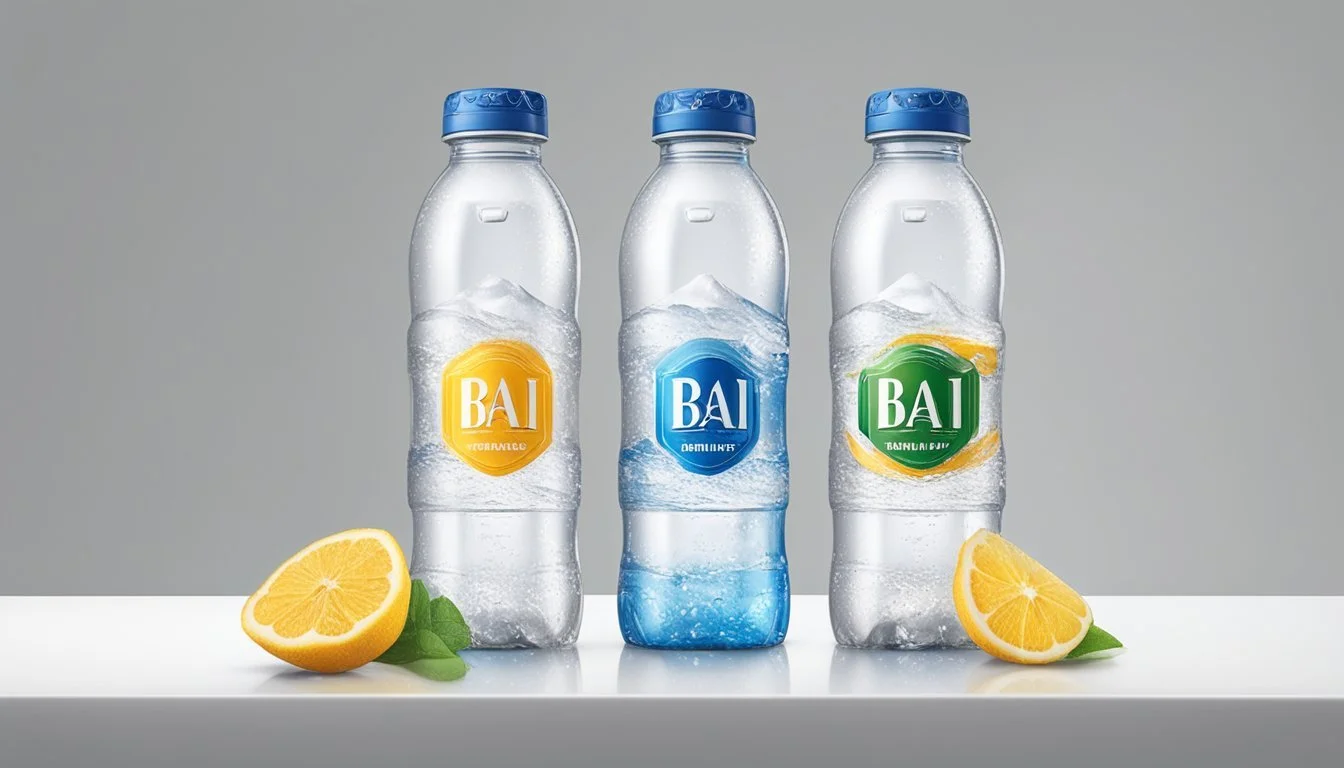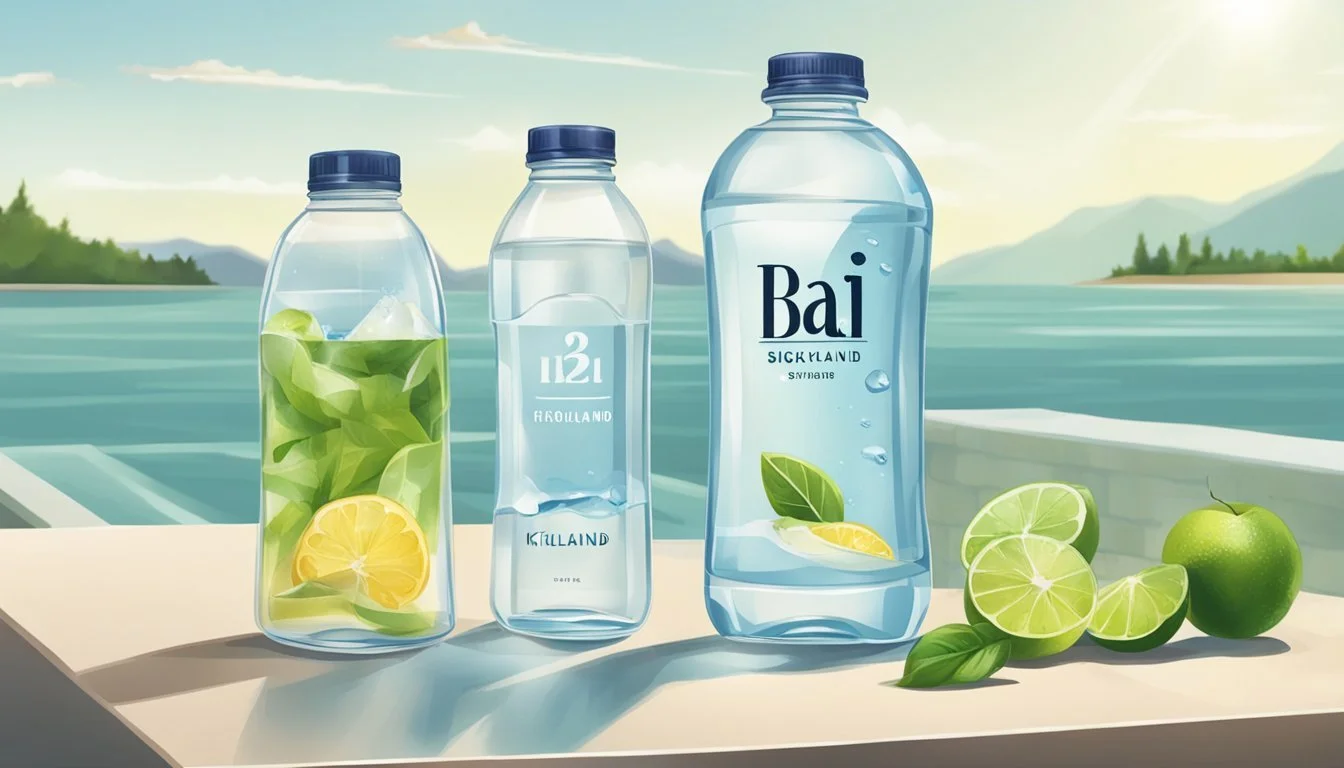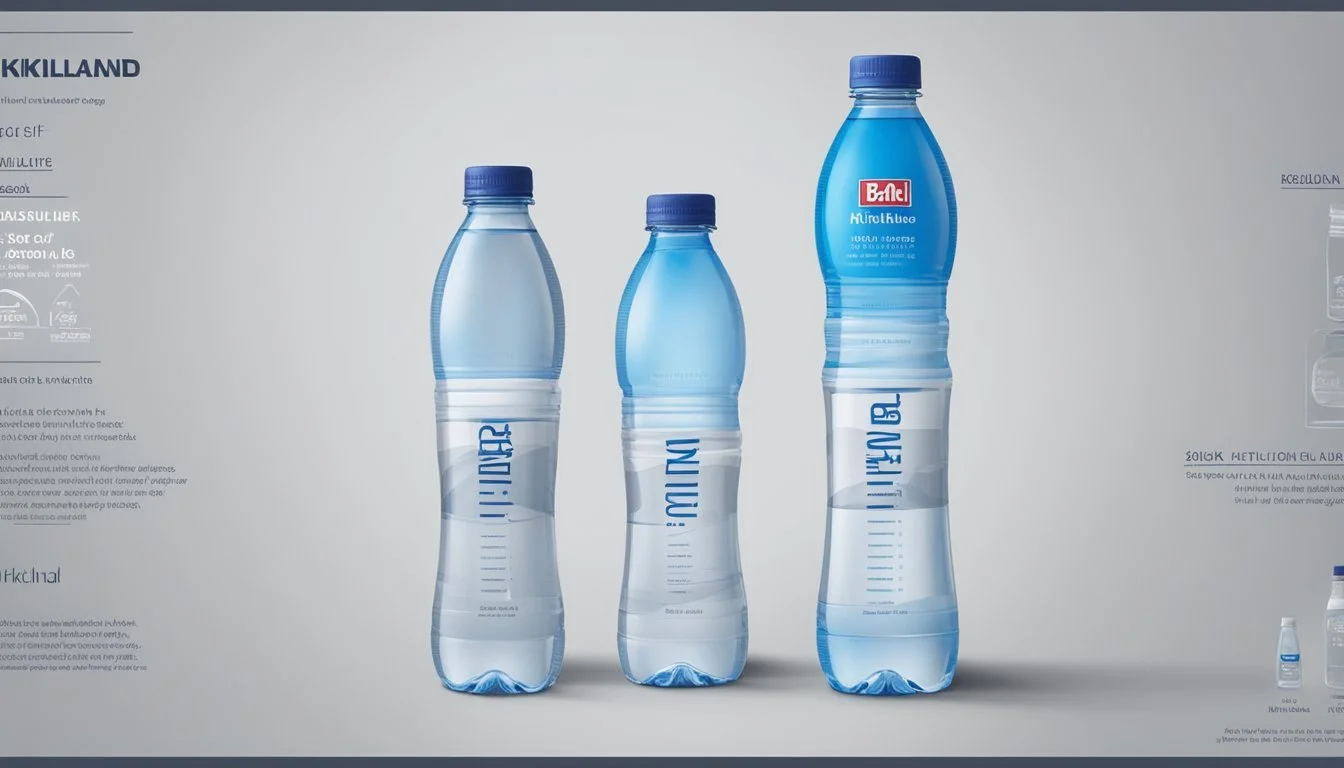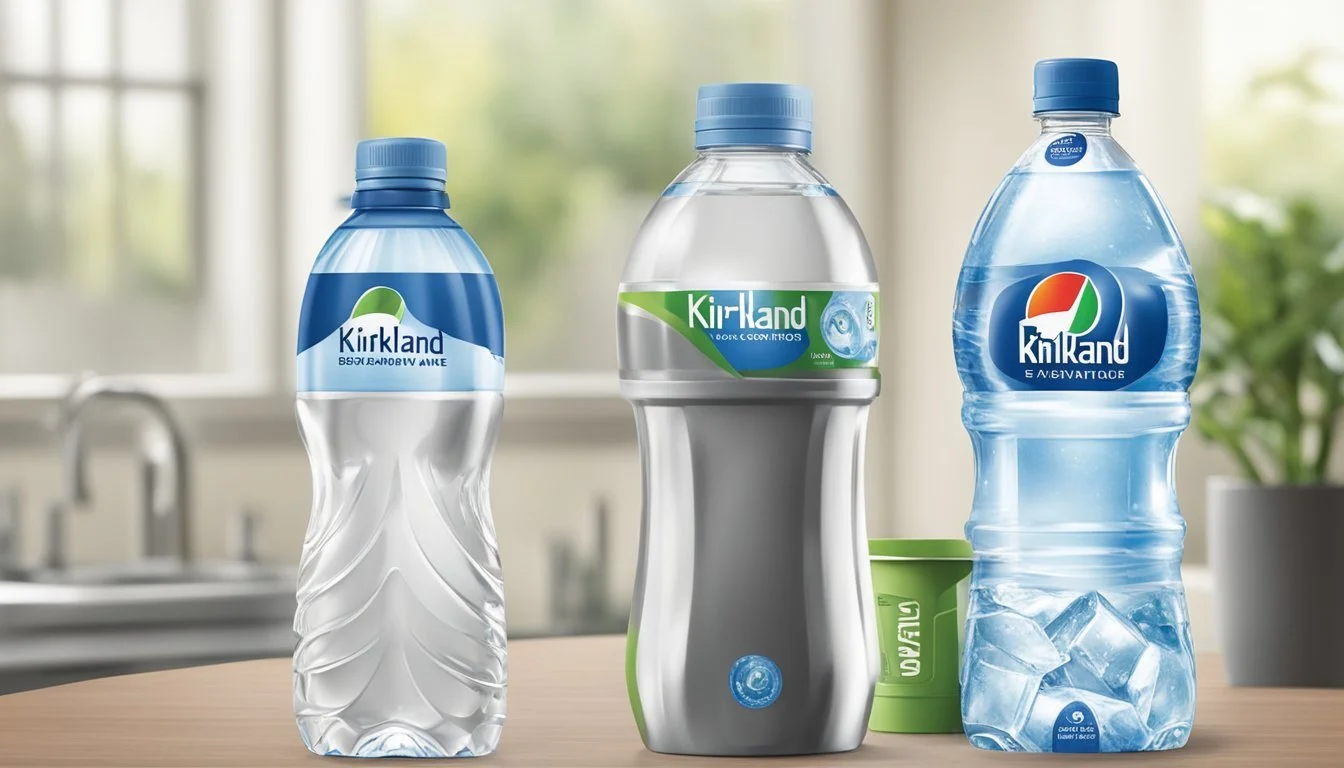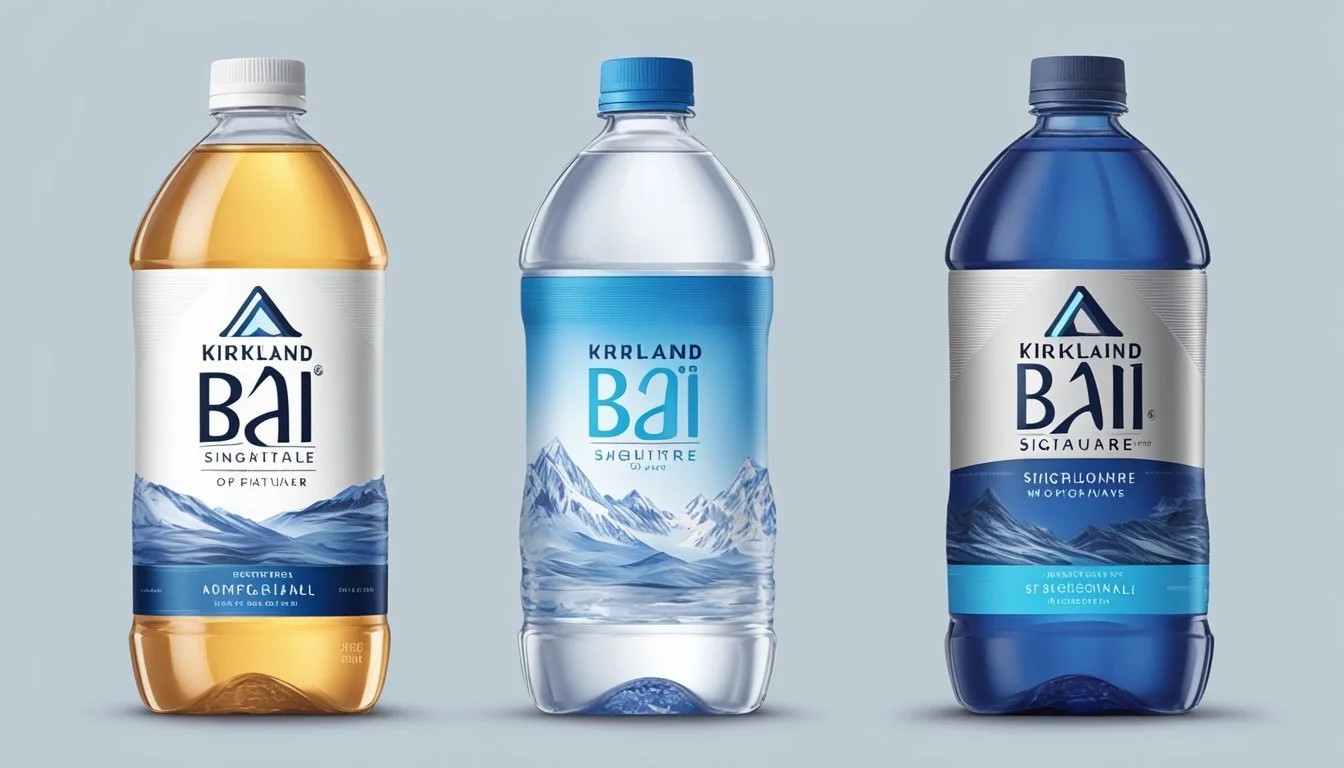Bai vs. Kirkland Signature
A Comparative Analysis of Bottled Water Quality
Choosing between Bai and Kirkland Signature for bottled water can be a tough decision for health-conscious consumers. Bai stands out for its unique inclusion of coffee fruit extract, providing antioxidants along with its hydration. Kirkland Signature, offered by Costco, is known for its purified taste and affordability, making it a popular choice for many households.
Bai's appeal lies in its health benefits, including low sugar content and added nutrients, which cater to those looking to boost their vitamin intake and support their wellness goals. Kirkland Signature, on the other hand, delivers reliability and consistency in taste at an economical price, making it an accessible option for everyday hydration.
Both brands have their merits, but the choice ultimately depends on individual preferences and priorities, whether it's the nutritional boost from Bai or the straightforward, budget-friendly hydration from Kirkland Signature. Readers can weigh these factors to decide which brand better aligns with their lifestyle needs.
Overview of Bai and Kirkland Signature
Bai and Kirkland Signature offer distinct approaches to bottled water. Bai focuses on enhanced hydration with added antioxidants and flavors, while Kirkland Signature delivers straightforward purified water through Costco’s private label.
History and Brand Mission
Bai was founded in 2009 by entrepreneur Ben Weiss. The brand emerged from a desire to create healthier, flavorful beverages. Bai has become renowned for its antioxidant-infused drinks, aiming to offer a refreshing experience with benefits like increased hydration and energy.
Kirkland Signature, Costco's private label, was launched in 1995 to offer high-quality products at a lower price. Their bottled water is sourced and bottled by Niagara Bottling, and the mission centers on providing value without compromising quality. The brand integrates environmental considerations in its sourcing and packaging methods.
Product Range
Bai offers a range of flavored beverages under the water category, including its popular Antioxidant Water and Bubbles line. With flavors like Coconut, Blackberry, and Watermelon, Bai enhances the regular hydration experience and provides options suited for various tastes. The beverages are also infused with vitamins and antioxidants.
Kirkland Signature focuses mostly on purified bottled water with minimal frills. The water is processed using advanced filtration, ensuring it is free from impurities. Available predominantly in bulk quantities, Kirkland Signature water addresses the needs of consumers looking for both affordability and reliable hydration.
Water Quality and Sources
When comparing Bai and Kirkland Signature bottled waters, understanding their water quality and sources is crucial. These factors significantly influence consumer choices, ensuring safety, taste, and value.
Source Identification
Bai Bottled Water sources its water from natural springs known for their purity and refreshing taste. It’s often rich in natural minerals, which can enhance the water's flavor and provide health benefits. Bai emphasizes the pristine nature of its water sources, ensuring minimal human interference and preserving the natural qualities of the water.
Kirkland Signature Bottled Water is sourced from various geographic locations, including municipal supplies. According to Consumer Reports, it undergoes rigorous filtration processes to remove contaminants and impurities. This process aims to ensure the water is safe to drink and maintains a consistent taste. Kirkland also adheres to sourcing regulations to provide a trustworthy product.
Quality Reports and Standards
Bai Water adheres to strict quality controls and standards set by regulatory bodies such as the EPA (Environmental Protection Agency) and the International Bottled Water Association (IBWA). The company regularly tests its water to maintain high safety and quality standards. These tests ensure the water remains free from harmful substances and balanced in essential minerals. Bai's commitment to transparency includes making these reports accessible to consumers.
Kirkland Signature Water also meets stringent quality standards. Consumer Reports noted that popular brands, including Kirkland, often contain trace amounts of minerals and occasionally, other additives during the filtration process. The brand ensures its water undergoes extensive testing for contaminants like PFAS chemicals. The filtration techniques employed by Kirkland meet EPA regulations, ensuring the water is both safe and of high quality.
By adhering to these rigorous standards, both Bai and Kirkland Signature ensure their bottled water is reliably safe and consistent for consumers.
Health and Nutrition Factors
When comparing Bai and Kirkland Signature bottled water, it’s crucial to evaluate their nutritional content and beneficial additives or ingredients. This analysis helps determine which option may offer more health benefits.
Nutritional Content Comparison
Bai water and Kirkland Signature bottled water present different nutritional profiles. Kirkland Signature primarily offers plain water, containing no calories, sugar, or additives. This makes it a straightforward choice for hydration without additional nutritional benefits.
In contrast, Bai water includes 10 calories per bottle and contains 1 gram of sugar. While it adds minimal calories, the presence of a small amount of sugar differentiates it from plain water. Bai also uses erythritol as a sweetener, which is a sugar alcohol known for having little to no effect on blood sugar levels. This makes Bai a low-calorie option with a slight nutritional edge in terms of added nutrients.
Nutritional Element Bai Water Kirkland Signature Calories 10 0 Sugar 1g 0g Sweeteners Erythritol None
Beneficial Additives and Ingredients
Bai water includes several beneficial ingredients not found in Kirkland Signature bottled water. It is infused with antioxidants derived from coffee fruit extract and other compounds like vitamin C. These antioxidants can help combat oxidative stress, which is linked to several chronic diseases and supports overall heart health.
Additionally, Bai water incorporates vegetable juice concentrate as a natural colorant, avoiding artificial colors. This includes natural juices like watermelon, which have been shown in studies to improve cognitive function.
Kirkland Signature does not include additional ingredients or vitamins. It remains a basic, unaltered water option. This simplicity can be ideal for consumers seeking pure hydration without any additives, but may lack the extra health benefits found in Bai.
In summary, while both Bai and Kirkland Signature bottled water offer hydration, Bai provides added nutritional benefits through its unique ingredients and antioxidants.
Packaging and Environmental Impact
Both Bai and Kirkland Signature offer bottled water options with distinct approaches to packaging and their environmental impact. This section examines the materials used for their bottles and the sustainability practices that each company implements.
Bottle Design and Materials
Bai utilizes primarily plastic bottles for its water products. The use of PET plastic is common, which is lightweight and recyclable. However, plastic's long decomposition time can contribute to environmental concerns if not properly recycled.
Kirkland Signature also uses plastic bottles, specifically PET plastic, known for its durability and recycling capacity. On some products, they have reduced the weight of the plastic used, minimizing waste while maintaining the bottle’s integrity.
Comparison: Both brands rely on plastic bottles, which are recyclable but still pose some environmental challenges. Neither significantly deviates from the industry norm of PET plastic.
Sustainability Practices
Bai places emphasis on creating healthier beverage options, yet their sustainability efforts focus heavily on the recyclability of their plastic bottles. They encourage customers to recycle and have explored lighter bottle designs to reduce plastic usage.
Kirkland Signature has undertaken initiatives to make their production more sustainable. They focus on reducing the carbon footprint of their manufacturing process and have lightweighted their bottles to use less plastic.
Comparison: While both brands focus on improving the recyclability of their packaging, Kirkland Signature has made strides in reducing the carbon footprint of their production process, showing a deeper commitment to environmental sustainability.
Product Variants and Flavors
Bai and Kirkland Signature offer different product variants that cater to a range of preferences, including still and sparkling options, as well as diverse flavor profiles featuring both artificial and natural flavors.
Still and Sparkling Options
Bai primarily focuses on still flavored water, aiming to provide a healthier, low-calorie alternative to sugary drinks. They use a variety of flavors derived from natural sources, such as coconut, various berries, and citrus fruits. Each drink typically contains around 10 calories per serving, with antioxidants infused from natural fruit extracts.
On the other hand, Kirkland Signature's water offerings include both still and sparkling options. Their still water is bottled by Niagara Bottling and is known for its clean taste. The sparkling variants, while less extensive than Bai’s flavor range, often include basic flavors like lemon, lime, and berry.
Flavor Profiles and Natural Flavors
Bai's flavored waters are distinguished by their strong emphasis on natural flavors. They blend fruits like dragon fruit, pear, and peach, creating unique taste combinations that stand out in the market. Bai uses natural sweeteners such as erythritol and stevia, giving their drinks a distinctive, refreshing quality without the added sugar.
On the contrary, Kirkland Signature's sparkling waters, although simpler, rely on a mix of natural and artificial flavors to appeal to a broader audience. While they do include natural fruit essences, the flavors are generally more traditional and less varied than Bai’s offerings. The Kirkland Signature bottled water line maintains a straightforward palette, making it a suitable choice for those who prefer classic, unembellished water options.
Comparative Analysis of Taste and Palatability
Bai beverages offer a unique taste profile thanks to added flavors and sweeteners. It is characterized by its slightly sweet and fruity undertone which appeals to those who prefer flavored water. Bai contains 1 gram of sugar and 10 calories per bottle.
In contrast, Kirkland Signature presents a neutral taste, attributed to its ionized alkaline water with a pH of 9.5. The high pH level can give it a slightly smoother texture, often considered refreshing.
Comparison of Flavor Profiles
Brand Flavor Profile Key Characteristics Bai Slightly sweet, fruity 1g sugar, 10 calories Kirkland Signature Neutral, smooth Ionized alkaline, pH 9.5
Bai's sweetness level comes from natural flavors which may include fruit extracts. Some consumers find this appealing, while others prefer the purer taste of Kirkland Signature.
Kirkland Signature water has been praised for its clean and crisp taste, free from aftertastes found in many bottled waters. This absence of a strong flavor can appeal to those seeking simplicity.
Consumers might also consider the presence of minerals. Kirkland Signature's alkaline nature includes added electrolytes for taste, while Bai's ingredients mainly focus on flavor enhancement rather than mineral content.
In summary, the choice between Bai and Kirkland Signature often comes down to personal preference. Those who enjoy flavored water may lean towards Bai, while those who prefer a clean, smooth taste may opt for Kirkland Signature.
Consumer Perceptions and Brand Reputation
Both Bai and Kirkland Signature bottled waters have unique strengths and consumer perceptions. Evaluating customer feedback and analyzing market trends provides insight into their brand reputations.
Customer Reviews and Testimonials
Bai often receives positive feedback for its flavored water options. Consumers appreciate its low-calorie counts and the addition of antioxidants. This health-oriented approach makes it appealing to fitness enthusiasts and those mindful of their diet.
On the other hand, Kirkland Signature is known for its reliable, purified taste. Some reviews highlight a slight saccharine flavor, but many value it for its consistent quality and affordability. Given Costco's reputation for quality, Kirkland's association with Niagara Bottling reassures many customers of its safety and purity.
Market Performance and Trends
Bai benefits from its visibility in health and wellness communities. Its flavored water and antioxidant infusions cater to a niche market interested in healthy lifestyle choices. This positioning has helped Bai carve out a loyal customer base in the competitive bottled water industry.
In contrast, Kirkland Signature leverages Costco’s vast distribution network across the United States. Its affordability and reliability have made it one of the top private label bottled waters. This mass-market appeal, combined with public trust in Costco’s branding, supports its strong market performance.
Both brands maintain a solid position in the market, each targeting different consumer needs and preferences. Bai's health-focused attributes set it apart in niche markets, while Kirkland Signature’s cost-efficiency and reliability make it a household staple.
Pricing and Accessibility
When comparing pricing and accessibility, it is essential to consider the cost of each option and the ease with which consumers can purchase these products. Pricing for Bai and Kirkland Signature water varies significantly, influenced by factors such as packaging, availability, and retail channels.
Cost Comparisons
Bai water, known for its flavored options, typically costs more per serving due to added ingredients and branding. Prices can vary, but a 12-pack of Bai water often ranges from $18 to $24. This higher price reflects the brand's positioning in the premium bottled water segment.
Kirkland Signature, available primarily through Costco, offers a more budget-friendly option. A case of 40 bottles of Kirkland water usually costs around $4 to $6, making it significantly cheaper on a per-bottle basis.
The difference in cost makes Kirkland an attractive choice for those seeking affordability. However, consumers willing to pay a premium for flavor and added nutrients might prefer Bai.
Availability and Retail Channels
Bai water is widely accessible through various retail channels, including Amazon, supermarkets, and direct purchases from Bai's website. This broad distribution ensures consumers can conveniently purchase Bai water online or in-store. The brand's availability in health-focused stores and its presence on prominent e-commerce platforms increase its accessibility.
Kirkland Signature water, on the other hand, is predominantly sold at Costco. Consequently, access may be limited to those with Costco memberships. However, the popularity of Costco ensures widespread availability for members, often prompting them to stock up on this affordable option during regular shopping trips.
While Bai's distribution network is expansive, giving it an edge in accessibility, Kirkland water's presence at Costco provides a reliable purchase point for those associated with the wholesale retailer.
Potential Risks and Controversies
Concerns about bottled water safety often focus on the presence of harmful chemicals. Consumer Reports tests highlighted that some bottled waters, including popular brands, may contain PFAS, known as "forever chemicals."
Plastic bottles used for packaging Bai and Kirkland Signature water also pose potential risks. Chemicals from plastic can leach into the water, especially when exposed to heat.
Lead contamination remains a critical issue for public health. Although less common in bottled water compared to tap water, the risk cannot be fully dismissed.
Artificial sweeteners in flavored waters like Bai raise questions about long-term health effects. While these sweeteners reduce calorie intake, their impact on conditions like obesity and diabetes continues to be scrutinized.
Potential cancer risks are often cited in discussions about consuming water contaminants. The presence of certain chemicals, even at low levels, could theoretically increase this risk over time.
Public health experts question the necessity of bottled water where safe tap water is available. They argue that reliance on bottled water undermines confidence in public water systems.
Environmental concerns also intersect with health issues, as the production and disposal of plastic bottles contribute to pollution, affecting water sources and ecosystems negatively.
In summary, while bottled waters like Bai and Kirkland Signature offer convenience, they are not without their controversies and potential risks, particularly related to chemicals and packaging materials.
Conclusion and Final Thoughts
Comparing Bai and Kirkland Signature bottled water reveals distinct attributes catering to different preferences and needs.
Hydration: Both brands effectively quench thirst, essential for maintaining hydration. However, their compositions differ slightly, influencing their taste and additional benefits.
Natural Sources: Kirkland Signature water is sourced from Niagara Bottling, ensuring consistent quality. Bai, often praised for its flavored varieties, incorporates natural fruit extracts and antioxidants.
Health Benefits: Kirkland provides pure, safe drinking water, as confirmed by experts. Bai offers additional health benefits with its low-calorie count and antioxidant infusions. This makes Bai an attractive option for health-conscious consumers.
Economic Considerations: Kirkland Signature water is often more economical, making large quantities affordable for consumers. Bai, while slightly pricier, offers unique flavors and added health benefits justifying the cost for some.
Alternative Options: For those seeking pure hydration without added flavors, Kirkland is a reliable choice. Bai appeals to those looking for an alternative with natural fruit flavors and additional health benefits.
Both brands deliver on their promises, making them suitable bottled water options for different consumer needs. The choice hinges on individual preferences for flavor, health benefits, and budget.

